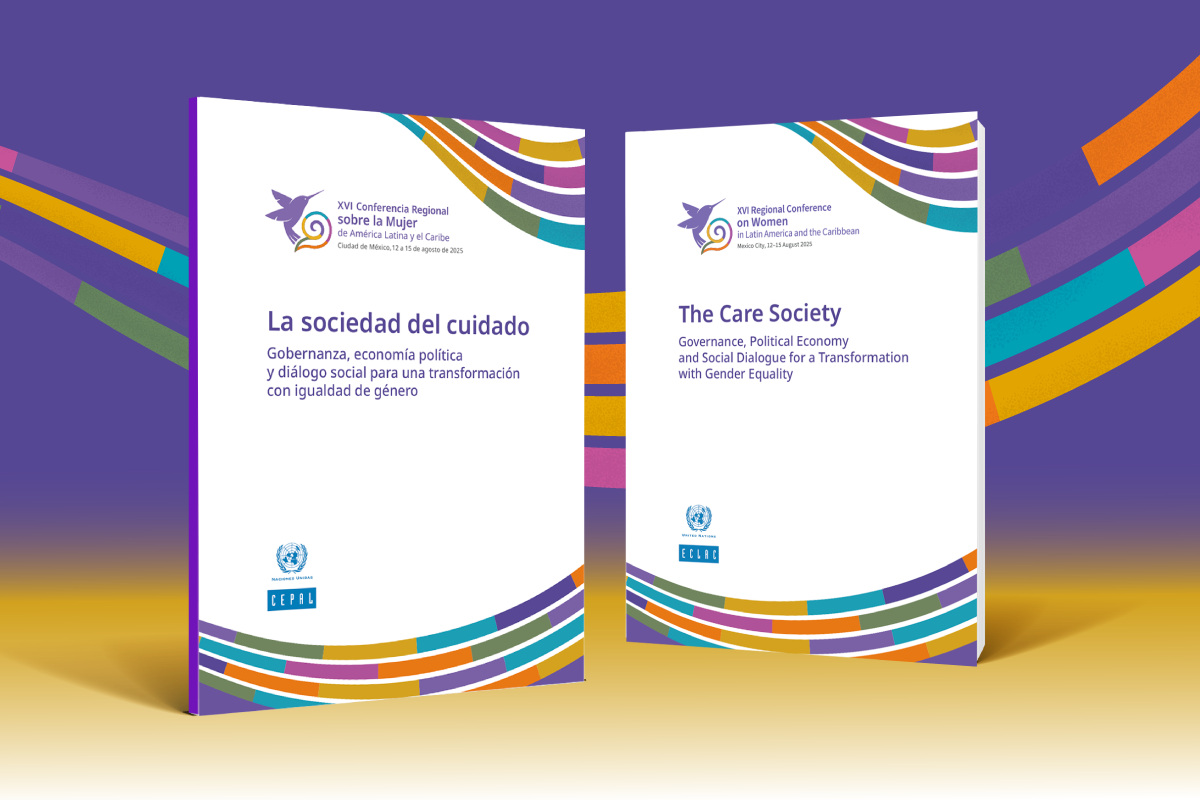How Can We Achieve the Care Society in Latin America and the Caribbean?
Work area(s)
A position paper presented by ECLAC’s Executive Secretary, José Manuel Salazar-Xirinachs, at the XVI Regional Conference on Women in Latin America and the Caribbean, analyzes how to more effectively manage the major transformation towards the care society in the region.

On the second day of the XVI Regional Conference on Women in Latin America and the Caribbean, which is being held through Friday, August 15 in Mexico City, ECLAC’s Executive Secretary, José Manuel Salazar-Xirinachs, presented the position paper The Care Society: Governance, Political Economy and Social Dialogue for a Transformation with Gender Equality, which is inspiring the intergovernmental gathering’s debates at the Centro Cultural Universitario Tlatelolco.
“Moving towards the care society is one of the vital transformations required to foster more productive, inclusive and sustainable development in Latin America and the Caribbean,” underscored José Manuel Salazar-Xirinachs in his presentation, which featured comments by Paula Narváez Ojeda, Permanent Representative of Chile to the United Nations; Rhoda Reddock, Vice-Chair of the Committee on the Elimination of Discrimination against Women, representing the Latin American and Caribbean Group (GRULAC); María-Noel Vaeza, Regional Director for the Americas and the Caribbean of UN Women; Laura Pautassi, Lead Researcher at the National Council for Scientific and Technical Research (CONICET) of Argentina and Chair of the Board of Directors of the Latin American Justice and Gender Team (ELA); Rebeca Grynspan, Secretary-General of the United Nations Conference on Trade and Development (UNCTAD); and Citlalli Hernández Mora, Minister for Women of Mexico.
According to the document, it is necessary to develop technical, operational, political and prospective (TOPP) capabilities in the institutions responsible for this major transformation towards the care society.
Key to achieving this goal are spaces for social dialogue to forge broad, shared visions; the governance schemes and capacities of the institutions responsible for care policies and systems at all levels; the cultural shift needed to challenge patriarchal patterns and make the reappraisal and redistribution of care between men and women viable; the mobilization of financial resources; and continuing to break the statistical silence, the publication specifies.
The care society concept – the document explains – prioritizes the sustainability of life and the care of people and the planet, recognizing the synergistic interdependence among people, the environment, and economic and social development.
According to the publication, eight countries have passed laws establishing national care policies and systems (Brazil, Colombia, Costa Rica, Cuba, Ecuador, Panama, Uruguay and Venezuela); 15 countries have established maternity leave of at least 14 weeks (ILO Convention No. 183); and 4 countries have implemented paid parental leave (Chile, Colombia, Cuba and Uruguay).
With regard to statistical advances, 24 countries have official time-use measurements; 18 report on SDG indicator 5.4.1 on unpaid domestic and care work; and 5 have calculated an official satellite account for unpaid household work.
The Economic Commission for Latin America and the Caribbean (ECLAC) and the International Labour Organization (ILO) estimate that in order to achieve international standards in terms of child and elder care services and leave by 2035, it would be necessary to progressively increase the resources allocated to care by an average of 0.4% of GDP per year until an annual investment of 4.7% of GDP is reached in 2035 for the 23 countries of the region included in the study.
This is a substantial investment, but with tremendous benefits. These include the creation of 31 million jobs in the 23 countries with available information, which would represent 12% of the labor force projected for 2035; the closure of the gender gap in labor market participation, with women’s employment rising from 52.9% in 2019 to a projected rate of 63.2% in 2035, with the contribution to GDP growth that would entail; tax revenue offsetting around 19% of the investment cost; and positive impacts in terms of well-being, health conditions, and training and skills-building opportunities.
“Care must be recognized as a need, as a right, as productive work that has the potential to drive the economy as a whole, and as a global public good,” ECLAC’s Executive Secretary summed up in his presentation.
“Latin America and the Caribbean is calling for a decade of action to accelerate the achievement of substantive gender equality and the care society. This is an urgent and unequivocal call: acting now will sow the seeds of hope for future generations and ensure that care, in all its forms, is recognized as the foundation of a more just society,” José Manuel Salazar-Xirinachs concluded.
The XVI Regional Conference on Women in Latin America and the Caribbean is bringing together senior authorities from Mexico, elsewhere in Latin America and the Caribbean and from ECLAC’s Member States, along with representatives of multilateral organizations, academia, parliaments and civil society – particularly women’s and feminist organizations and movements.
Organized since 1977 by ECLAC, which serves as the Secretariat, and since 2020 in coordination with the United Nations Entity for Gender Equality and the Empowerment of Women (UN Women), the Conference this year, under Mexico’s leadership as Chair, is addressing “political, economic, social, cultural and environmental transformations as a means of advancing the care society and gender equality.”
Related content
The Care Society: Governance, Political Economy and Social Dialogue for a Transformation with Gender Equality
Presentation by ECLAC Executive Secretary, José Manuel Salazar-Xirinachs, at the XVI Regional Conference on Women in Latin America and the Caribbean.
Related event

XVI Regional Conference on Women in Latin America and the Caribbean
<p>The sixteenth session of the Regional Conference on Women in Latin America and the Caribbean was held at the Centro Cultural Universitario Tlatelolco in Mexico City, from 12 to 15 August 2025, and…
Subregional headquarter(s) and office(s)
Type
Contact
Public Information Unit
- prensa@cepal.org
- (56 2) 2210 2040
